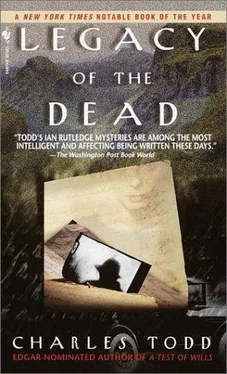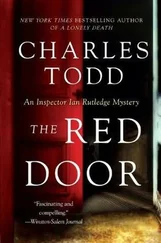Charles Todd - Legacy of the Dead
Здесь есть возможность читать онлайн «Charles Todd - Legacy of the Dead» весь текст электронной книги совершенно бесплатно (целиком полную версию без сокращений). В некоторых случаях можно слушать аудио, скачать через торрент в формате fb2 и присутствует краткое содержание. Жанр: Полицейский детектив, на английском языке. Описание произведения, (предисловие) а так же отзывы посетителей доступны на портале библиотеки ЛибКат.
- Название:Legacy of the Dead
- Автор:
- Жанр:
- Год:неизвестен
- ISBN:нет данных
- Рейтинг книги:5 / 5. Голосов: 1
-
Избранное:Добавить в избранное
- Отзывы:
-
Ваша оценка:
- 100
- 1
- 2
- 3
- 4
- 5
Legacy of the Dead: краткое содержание, описание и аннотация
Предлагаем к чтению аннотацию, описание, краткое содержание или предисловие (зависит от того, что написал сам автор книги «Legacy of the Dead»). Если вы не нашли необходимую информацию о книге — напишите в комментариях, мы постараемся отыскать её.
Legacy of the Dead — читать онлайн бесплатно полную книгу (весь текст) целиком
Ниже представлен текст книги, разбитый по страницам. Система сохранения места последней прочитанной страницы, позволяет с удобством читать онлайн бесплатно книгу «Legacy of the Dead», без необходимости каждый раз заново искать на чём Вы остановились. Поставьте закладку, и сможете в любой момент перейти на страницу, на которой закончили чтение.
Интервал:
Закладка:
He could hear Trevor running lightly down the stairs, opening the door, whistling for the dogs. The weekend had given his godfather a new energy.
“What harm did it do?” She reached for the frying pan. “Alistair’s an honest lad with a wish to do what’s right. Should I have sent him away without a hearing? As if I couldn’t trust you to be just?”
“No. But it isn’t my case, you see. It’s Inspector Oliver’s. And McKinstry doesn’t know me. I could have made trouble for him, reported him for going over the head of his superior. Or put him in jeopardy for trying to influence my actions.” Bowles would have done so, for one. Another thought occurred to him. “Could the child be his?”
“He was in France. And he does know you. He met you at an aid station behind the front lines. He’d been shot in the leg. He said you were one of the bravest men he’d ever met. You’d just brought in three men who’d been gassed and left for dead near a German outpost. Somehow you found them and got them out. Alistair was glad to shake your hand.”
Trevor was striding down the passage, speaking to his dogs. The big kitchen suddenly seemed small, close, and overheated. Hamish, alive in his mind, was as loud as a voice in the room. Rutledge could barely remember that day at the aid station, and certainly not the face of the soldier lying on a stretcher close by who had shaken his hand. As the doctors cleaned a cut on his wrist, he’d stood there grimly, unaware of pain. It had happened not too long after Hamish’s death, and Rutledge had purposely taken risks, wanting to die. It hadn’t been courage, it had been desperation-anything to silence the voice in his head. Even death.
Morag was talking, but her words failed to register. Trevor was greeting him, and the dogs frisked noisily about his feet.
Trevor said, “Ian, are you all right?”
Rutledge shook his head to clear it. “Yes, I’m fine. Morag was telling me about a relation of hers. It brought back some memories, that’s all.” To Morag he said, “I’m sorry. I don’t seem to place him.”
But afterward, as he walked down to a stream with Trevor, talking about his work, he found himself thinking again about McKinstry. What the young policeman had wanted from him was some semblance of hope. The promise that if he took over the case, he’d be objective, not swept up in the conclusions already drawn.
It didn’t matter. There was no reason for him to be involved. He’d finished his business with Lady Maude, and the rest of the case would be in the hands of the courts. He didn’t want to stay in Scotland.
On Monday morning, Rutledge put in a telephone call to London from David Trevor’s study.
Bowles, summoned to the telephone, answered brusquely, “Rutledge, is that you?”
“Yes.” He quickly summarized his conversation with Lady Maude and ended with his own view. “It’s hard to say. In my opinion, she doesn’t know where her daughter is presently, and it’s quite possible that she’s at one of the teaching hospitals-”
“I’ve already had the report on that. There’s no Eleanor Gray wanting to become a doctor.”
“She might have used another name-”
“Yes, yes, I’m aware of that, but there’s no one who matches the physical description you gave Sergeant Owens. I’d say at a guess that whatever the quarrel was about, it was not medicine that the young woman left home for. She might not have told her mother the truth.” There was a pause. “One thing we did learn. She was a suffragette. Independent young miss, arrested a number of times for chaining herself to fences and making herself a public nuisance in whatever fashion got her the most notice. A young woman likely to find herself in trouble of one kind or another, I’d say. Sergeant Gibson remembered her from before the war, and he says she hasn’t been in trouble with the police for some years now. Could mean she’d learned her lesson. Or that she is dead.”
Bowles took a long breath, indicating a change of subject.
“We’ve had a call from Lady Maude. You’re to go to Scotland and find out what you can about this corpse. She’s insisting that you take over the case, and her family’s not to be dragged into it, no speculation about her daughter, public or private, until you are absolutely certain that the corpse is Eleanor Gray’s. What the hell did you say to her?”
7
By ten o’clock that morning, Rutledge had asked directions from Trevor, accepted the generous packet of sandwiches that Morag had put up for him, and turned south and west toward Jedburgh and Tweedesdale. It was a day of mixed sun and clouds, with a brief shower or two that raised the damp smell of earth. Long shadows were cast across the countryside when the sun came out, vanishing and reappearing like magic as the clouds shifted across the sky. There always seemed to be more sky in Scotland than in England, a different sky. Vast and empty, as if God weren’t at home.
He had come to Scotland for a weekend owed to his godfather, and now duty was keeping him here. He felt misgivings, his mind unsettled, the peace he’d found at Hadrian’s Wall worn off. And Hamish, in his accustomed place behind the driver’s shoulder, was as disturbed by the turn of events as Rutledge himself. He could hear the voice as clearly as if there were a passenger. Blaming-stubbornly refusing to accept the change in plans.
“And I’ll no’ go to the glen again-”
Rutledge tried to shut him out and then fell prey to another kind of haunting, awakened grief.
For the motorcar also carried the “ghost” of Ross Trevor. Rutledge had felt the dead man’s presence so strongly at The Lodge. In France he had arrived at an acceptance of Ross’s death, but in the house where Ross had spent every summer for twenty-five years or more, it seemed that he must surely be somewhere just out of sight-down the passage-upstairs in his room-out riding and expected soon-talking to Morag in the kitchen. His laughter preceding him, his swift, energetic footsteps approaching the door. Ross Trevor had been a powerful presence, and Rutledge had found himself watching the doorways, listening over the ticking of the grandfather’s clock or the wind in the eaves, for some sign of it. It seemed impossible that such a man had vanished so completely, swallowed by the sea Over the last four months, Rutledge had begun for the first time to realize what the civilian population had endured during the long, dark days when casualties mounted and there seemed to be no end to the fighting. It was different from the way that soldiers saw the dying. But no less terrible. A time for mourning…
He wondered if David felt that same sense of anticipation, and if he did, how he lived with it-and then realized that for Ross’s father and for Morag, it might be oddly comforting.
Hamish said, as if picking up the thought, “They never saw him dead. They never closed the lid over his coffin and watched the earth shoveled down on it. Like me, he never came home. And so they’re still waiting-”
Jedburgh, like its neighbors from Berwick to Dumfries, was not the Scotland of kilts and pipes and Bonnie Prince Charlie. These were the Marches that ran on either side of the frontier between Scotland and England, the border towns of the Lowlands, where a different kind of war had raged for centuries, raids into England for cattle and sheep and horses, shaping generations of hard men.
The English had raided north too, with equal vigor and cunning. It had been a way of life until the 1600s, sometimes condoned and sometimes condemned, but always profitable enough to be a main local industry. Union between Scotland and England had finally put a stop to that.
And the legacy of John Knox had narrowed the Borderer’s wild soul into a primmer mold where business and righteousness walked hand in hand: The Sabbath was holy, women knew their place, and the Kirk was a stronger influence in daily affairs than Edinburgh, much less far-off London.
Читать дальшеИнтервал:
Закладка:
Похожие книги на «Legacy of the Dead»
Представляем Вашему вниманию похожие книги на «Legacy of the Dead» списком для выбора. Мы отобрали схожую по названию и смыслу литературу в надежде предоставить читателям больше вариантов отыскать новые, интересные, ещё непрочитанные произведения.
Обсуждение, отзывы о книге «Legacy of the Dead» и просто собственные мнения читателей. Оставьте ваши комментарии, напишите, что Вы думаете о произведении, его смысле или главных героях. Укажите что конкретно понравилось, а что нет, и почему Вы так считаете.












